- Home
- Kate DiCamillo
The Miraculous Journey of Edward Tulane
The Miraculous Journey of Edward Tulane Read online
ONCE, IN A HOUSE ON EGYPT STREET, there lived a rabbit who was made almost entirely of china. He had china arms and china legs, china paws and a china head, a china torso and a china nose. His arms and legs were jointed and joined by wire so that his china elbows and china knees could be bent, giving him much freedom of movement.
His ears were made of real rabbit fur, and beneath the fur, there were strong, bendable wires, which allowed the ears to be arranged into poses that reflected the rabbit’s mood — jaunty, tired, full of ennui. His tail, too, was made of real rabbit fur and was fluffy and soft and well shaped.
The rabbit’s name was Edward Tulane, and he was tall. He measured almost three feet from the tip of his ears to the tip of his feet; his eyes were painted a penetrating and intelligent blue.
In all, Edward Tulane felt himself to be an exceptional specimen. Only his whiskers gave him pause. They were long and elegant (as they should be), but they were of uncertain origin. Edward felt quite strongly that they were not the whiskers of a rabbit. Whom the whiskers had belonged to initially — what unsavory animal — was a question that Edward could not bear to consider for too long. And so he did not. He preferred, as a rule, not to think unpleasant thoughts.
Edward’s mistress was a ten-year-old, dark-haired girl named Abilene Tulane, who thought almost as highly of Edward as Edward thought of himself. Each morning after she dressed herself for school, Abilene dressed Edward.
The china rabbit was in possession of an extraordinary wardrobe composed of handmade silk suits, custom shoes fashioned from the finest leather and designed specifically for his rabbit feet, and a wide array of hats equipped with holes so that they could easily fit over Edward’s large and expressive ears. Each pair of well-cut pants had a small pocket for Edward’s gold pocket watch. Abilene wound this watch for him each morning.
“Now, Edward,” she said to him after she was done winding the watch, “when the big hand is on the twelve and the little hand is on the three, I will come home to you.”
She placed Edward on a chair in the dining room and positioned the chair so that Edward was looking out the window and could see the path that led up to the Tulane front door. Abilene balanced the watch on his left leg. She kissed the tips of his ears, and then she left and Edward spent the day staring out at Egypt Street, listening to the tick of his watch and waiting.
Of all the seasons of the year, the rabbit most preferred winter, for the sun set early then and the dining-room windows became dark and Edward could see his own reflection in the glass. And what a reflection it was! What an elegant figure he cut! Edward never ceased to be amazed at his own fineness.
In the evening, Edward sat at the dining-room table with the other members of the Tulane family: Abilene; her mother and father; and Abilene’s grandmother, who was called Pellegrina. True, Edward’s ears barely cleared the tabletop, and true also, he spent the duration of the meal staring straight ahead at nothing but the bright and blinding white of the tablecloth. But he was there, a rabbit at the table.
Abilene’s parents found it charming that Abilene considered Edward real, and that she sometimes requested that a phrase or story be repeated because Edward had not heard it.
“Papa,” Abilene would say, “I’m afraid that Edward didn’t catch that last bit.”
Abilene’s father would then turn in the direction of Edward’s ears and speak slowly, repeating what he had just said for the benefit of the china rabbit. Edward pretended, out of courtesy to Abilene, to listen. But, in truth, he was not very interested in what people had to say. And also, he did not care for Abilene’s parents and their condescending manner toward him. All adults, in fact, condescended to him.
Only Abilene’s grandmother spoke to him as Abilene did, as one equal to another. Pellegrina was very old. She had a large, sharp nose and bright, black eyes that shone like dark stars. It was Pellegrina who was responsible for Edward’s existence. It was she who had commissioned his making, she who had ordered his silk suits and his pocket watch, his jaunty hats and his bendable ears, his fine leather shoes and his jointed arms and legs, all from a master craftsman in her native France. It was Pellegrina who had given him as a gift to Abilene on her seventh birthday.
And it was Pellegrina who came each night to tuck Abilene into her bed and Edward into his.
“Will you tell us a story, Pellegrina?” Abilene asked her grandmother each night.
“Not tonight, lady,” said Pellegrina.
“When?” asked Abilene. “What night?”
“Soon,” said Pellegrina. “Soon there will be a story.”
And then she turned off the light, and Edward and Abilene lay in the dark of the bedroom.
“I love you, Edward,” Abilene said each night after Pellegrina had left. She said those words and then she waited, almost as if she expected Edward to say something in return.
Edward said nothing. He said nothing because, of course, he could not speak. He lay in his small bed next to Abilene’s large one. He stared up at the ceiling and listened to the sound of her breath entering and leaving her body, knowing that soon she would be asleep. Because Edward’s eyes were painted on and he could not close them, he was always awake.
Sometimes, if Abilene put him into his bed on his side instead of on his back, he could see through the cracks in the curtains and out into the dark night. On clear nights, the stars shone, and their pinprick light comforted Edward in a way that he could not quite understand. Often, he stared at the stars all night until the dark finally gave way to dawn.
AND IN THIS MANNER, EDWARD’S days passed, one into the other. Nothing remarkable happened. Oh, there was the occasional small, domestic drama. Once, while Abilene was at school, the neighbor’s dog, a male brindled boxer inexplicably named Rosie, came into the house uninvited and unannounced and lifted his leg on the dining-room table, spraying the white tablecloth with urine. He then trotted over and sniffed Edward, and before Edward even had time to consider the implications of being sniffed by a dog, he was in Rosie’s mouth and Rosie was shaking him back and forth vigorously, growling and drooling.
Fortunately, Abilene’s mother walked past the dining room and witnessed Edward’s suffering.
“Drop it!” she shouted to Rosie.
And Rosie, surprised into obedience, did as he was told.
Edward’s silk suit was stained with drool and his head ached for several days afterward, but it was his ego that had suffered the most damage. Abilene’s mother had referred to him as “it,” and she was more outraged at the dog urine on her tablecloth than she was about the indignities that Edward had suffered at the jaws of Rosie.
And then there was the time that a maid, new to the Tulane household and eager to impress her employers with her diligence, came upon Edward sitting on his chair in the dining room.
“What’s this bunny doing here?” she said out loud.
Edward did not care at all for the word bunny. He found it derogatory in the extreme.
The maid bent over him and looked into his eyes.
“Hmph,” she said. She stood back up. She put her hands on her hips. “I reckon you’re just like every other thing in this house, something needing to be cleaned and dusted.”
And so the maid vacuumed Edward Tulane. She sucked each of his long ears up the vacuum-cleaner hose. She pawed at his clothes and beat his tail. She dusted his face with brutality and efficiency. And in her zeal to clean him, she vacuumed Edward’s gold pocket watch right off his lap. The watch went into the maw of the vacuum cleaner with a distressing clank that the maid did not even seem to hear.
When she was done, she put the dining-room chair back at the table, and un
certain about exactly where Edward belonged, she finally decided to shove him in among the dolls on a shelf in Abilene’s bedroom.
“That’s right,” said the maid. “There you go.”
She left Edward on the shelf at a most awkward and inhuman angle — his nose was actually touching his knees; and he waited there, with the dolls twittering and giggling at him like a flock of demented and unfriendly birds, until Abilene came home from school and found him missing and ran from room to room calling his name.
“Edward!” she shouted. “Edward!”
There was no way, of course, for him to let her know where he was, no way for him to answer her. He could only sit and wait.
When Abilene found him, she held him close, so close that Edward could feel her heart beating, leaping almost out of her chest in its agitation.
“Edward,” she said, “oh, Edward. I love you. I never want you to be away from me.”
The rabbit, too, was experiencing a great emotion. But it was not love. It was annoyance that he had been so mightily inconvenienced, that he had been handled by the maid as cavalierly as an inanimate object — a serving bowl, say, or a teapot. The only satisfaction to be had from the whole affair was that the new maid was dismissed immediately.
Edward’s pocket watch was located later, deep within the bowels of the vacuum cleaner, dented, but still in working condition; it was returned to him by Abilene’s father, who presented it with a mocking bow.
“Sir Edward,” he said. “Your timepiece, I believe?”
The Rosie Affair and the Vacuum-Cleaner Incident — those were the great dramas of Edward’s life until the night of Abilene’s eleventh birthday when, at the dinner table, as the cake was being served, the ship was mentioned.
SHE IS CALLED THE QUEEN MARY,” said Abilene’s father, “and you and your mama and I shall sail on her all the way to London.”
“What about Pellegrina?” said Abilene.
“I will not go,” said Pellegrina. “I will stay.”
Edward, of course, was not listening. He found the talk around the dinner table excruciatingly dull; in fact, he made a point of not listening if he could help it. But then Abilene did something unusual, something that forced him to pay attention. As the talk about the ship continued, Abilene reached for Edward and took him from his chair and stood him in her lap.
“And what about Edward?” she said, her voice high and uncertain.
“What about him, darling?” said her mother.
“Will Edward be sailing on the Queen Mary with us?”
“Well, of course, if you wish, although you are getting a little old for such things as china rabbits.”
“Nonsense,” said Abilene’s father jovially. “Who would protect Abilene if Edward was not there?”
From the vantage point of Abilene’s lap, Edward could see the whole table spread out before him in a way that he never could when he was seated in his own chair. He looked upon the glittering array of silverware and glasses and plates. He saw the amused and condescending looks of Abilene’s parents. And then his eyes met Pellegrina’s.
She was looking at him in the way a hawk hanging lazily in the air might study a mouse on the ground. Perhaps the rabbit fur on Edward’s ears and tail, and the whiskers on his nose had some dim memory of being hunted, for a shiver went through him.
“Yes,” said Pellegrina without taking her eyes off Edward, “who would watch over Abilene if the rabbit were not there?”
That night, when Abilene asked, as she did every night, if there would be a story, Pellegrina said, “Tonight, lady, there will be a story.”
Abilene sat up in bed. “I think that Edward needs to sit here with me,” she said, “so that he can hear the story, too.”
“I think that is best,” said Pellegrina. “Yes, I think that the rabbit must hear the story.”
Abilene picked Edward up, sat him next to her in bed, and arranged the covers around him; then she said to Pellegrina, “We are ready now.”
“So,” said Pellegrina. She coughed. “And so. The story begins with a princess.”
“A beautiful princess?” Abilene asked.
“A very beautiful princess.”
“How beautiful?”
“You must listen,” said Pellegrina. “It is all in the story.”
ONCE THERE WAS A PRINCESS WHO was very beautiful. She shone as bright as the stars on a moonless night. But what difference did it make that she was beautiful? None. No difference.”
“Why did it make no difference?” asked Abilene.
“Because,” said Pellegrina, “she was a princess who loved no one and cared nothing for love, even though there were many who loved her.”
At this point in her story, Pellegrina stopped and looked right at Edward. She stared deep into his painted-on eyes, and again, Edward felt a shiver go through him.
“And so,” said Pellegrina, still staring at Edward.
“What happened to the princess?” said Abilene.
“And so,” said Pellegrina, turning back to Abilene, “the king, her father, said that the princess must marry; and soon after this, a prince came from a neighboring kingdom and he saw the princess and, immediately, he loved her. He gave her a ring of pure gold. He placed it on her finger. He said these words to her: ‘I love you.’ But do you know what the princess did?”
Abilene shook her head.
“She swallowed the ring. She took it from her finger and swallowed it. She said, ‘That is what I think of love.’ And she ran from the prince. She left the castle and went deep into the woods. And so.”
“And so what?” said Abilene. “What happened then?”
“And so, the princess became lost in the woods. She wandered for many days. Finally, she came to a little hut, and she knocked on the door. She said, ‘Let me in; I am cold.’
“There was no answer.
“She knocked again. She said, ‘Let me in; I am hungry.’
“A terrible voice answered her. The voice said, ‘Enter if you must.’
“The beautiful princess entered, and she saw a witch sitting at a table counting pieces of gold.
“‘Three thousand six hundred and twenty-two,’ said the witch.
“‘I am lost,’ said the beautiful princess.
“‘What of it?’ said the witch. ‘Three thousand six hundred and twenty-three.’
“‘I am hungry,’ said the princess.
“‘Not my concern,’ said the witch. ‘Three thousand six hundred and twenty-four.’
“‘But I am a beautiful princess,’ said the princess.
“‘Three thousand six hundred and twenty-five,’ replied the witch.
“‘My father,’ said the princess, ‘is a powerful king. You must help me or there will be consequences.’
“‘Consequences?’ said the witch. She looked up from her gold. She stared at the princess. ‘You dare to talk to me of consequences? Very well, then, we will speak of consequences: tell me the name of the one you love.’
“‘Love!’ said the princess. She stamped her foot. ‘Why must everyone always speak of love?’
“‘Whom do you love?’ said the witch. ‘You must tell me the name.’
“‘I love no one,’ said the princess proudly.
“‘You disappoint me,’ said the witch. She raised her hand and said one word: ‘Farthfigery.’
“And the beautiful princess was changed into a warthog.
“‘What have you done to me?’ squealed the princess.
“‘Talk to me of consequences now, will you?’ said the witch, and she went back to counting her pieces of gold. ‘Three thousand six hundred and twenty-six,’ said the witch as the warthog princess ran from the hut and out again into the forest.
“The kings’ men were in the forest, too. And what were they looking for? A beautiful princess. And so when they came upon an ugly warthog, they shot it immediately. Pow!”
“No,” said Abilene.
“Yes,” said Pellegrina. “The men
took the warthog back to the castle and the cook slit open its belly and inside it she found a ring of pure gold. There were many hungry people in the castle that night and all of them were waiting to be fed. So the cook put the ring on her finger and finished butchering the warthog. And the ring that the beautiful princess had swallowed shone on the cook’s hand as she did her work. The end.”
“The end?” said Abilene indignantly.
“Yes,” said Pellegrina, “the end.”
“But it can’t be.”
“Why can’t it be?”
“Because it came too quickly. Because no one is living happily ever after, that’s why.”
“Ah, and so.” Pellegrina nodded. She was quiet for a moment. “But answer me this: how can a story end happily if there is no love? But. Well. It is late. And you must go to sleep.”
Pellegrina took Edward from Abilene. She put him in his bed and pulled the sheet up to his whiskers. She leaned close to him. She whispered, “You disappoint me.”
After the old lady left, Edward lay in his small bed and stared up at the ceiling. The story, he thought, had been pointless. But then most stories were. He thought of the princess and how she had become a warthog. How gruesome! How grotesque! What a terrible fate!
“Edward,” said Abilene, “I love you. I don’t care how old I get, I will always love you.”
Yes, yes, thought Edward.
He continued to stare up at the ceiling. He was agitated for some reason that he could not name. He wished that Pellegrina had put him on his side so that he might look at the stars.
And then he remembered Pellegrina’s description of the beautiful princess. She shone as bright as the stars on a moonless night. For some reason, Edward found comfort in these words and he repeated them to himself — as bright as the stars on a moonless night, as bright as the stars on a moonless night — over and over until, at last, the first light of dawn appeared.
THE HOUSE ON EGYPT STREET became frantic with activity as the Tulane family prepared for their voyage to England. Edward possessed a small trunk, and Abilene packed it for him, filling it with his finest suits and several of his best hats and three pairs of shoes, all so that he might cut a fine figure in London. Before she placed each outfit in the trunk, she displayed it to him.

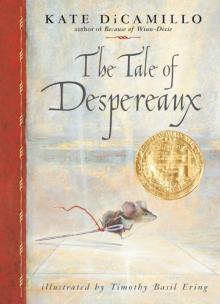 The Tale of Despereaux
The Tale of Despereaux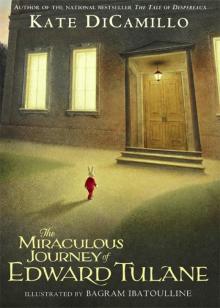 The Miraculous Journey of Edward Tulane
The Miraculous Journey of Edward Tulane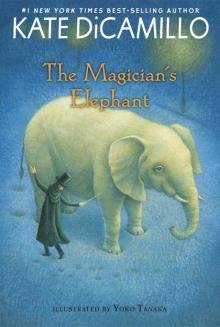 The Magician's Elephant
The Magician's Elephant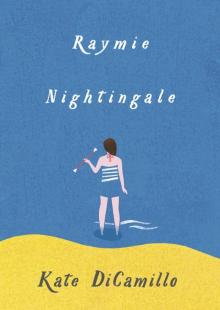 Raymie Nightingale
Raymie Nightingale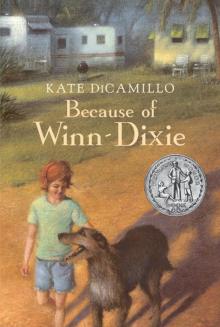 Because of Winn-Dixie
Because of Winn-Dixie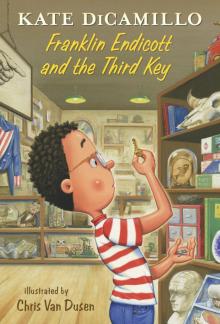 Franklin Endicott and the Third Key
Franklin Endicott and the Third Key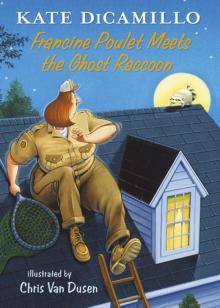 Francine Poulet Meets the Ghost Raccoon
Francine Poulet Meets the Ghost Raccoon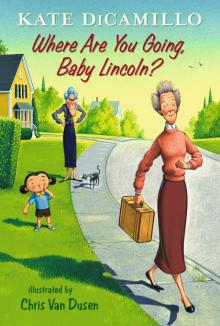 Where Are You Going, Baby Lincoln?
Where Are You Going, Baby Lincoln?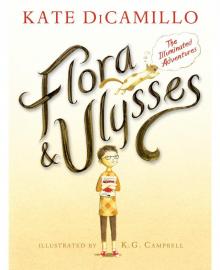 Flora & Ulysses: The Illuminated Adventures
Flora & Ulysses: The Illuminated Adventures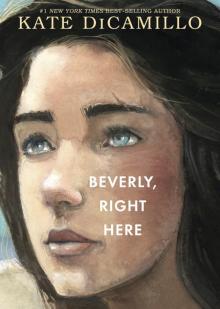 Beverly, Right Here
Beverly, Right Here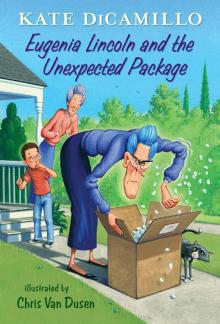 Eugenia Lincoln and the Unexpected Package
Eugenia Lincoln and the Unexpected Package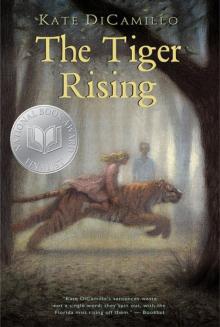 The Tiger Rising
The Tiger Rising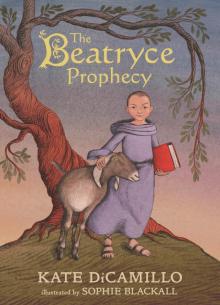 The Beatryce Prophecy
The Beatryce Prophecy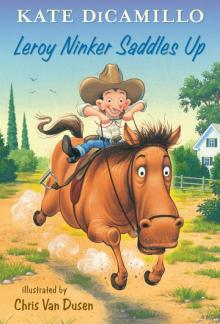 Leroy Ninker Saddles Up
Leroy Ninker Saddles Up